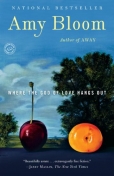BKMT READING GUIDES
Where the God of Love Hangs Out: Fiction (Random House Reader's Circle)
by Amy Bloom
Paperback : 240 pages
0 club reading this now
1 member has read this book
Introduction
(Love, in its many forms and complexities, weaves through this collection by Amy Bloom, the New York Times bestselling author of Away. Bloom's astonishing and astute stories illuminate the mysteries of passion, family, and friendship. A young woman is haunted by her roommate's murder; a man and his daughter-in-law confess their sins in the unlikeliest of places; two middle-aged, married friends find themselves surprisingly drawn to each other, risking all for their love but never underestimating the cost. Propelled by Bloom's dazzling prose, unmistakable voice, and generous wit, Where the God of Love Hangs Out takes us to the margins and the centers of people's emotional lives, exploring the changes that come with love and loss.
Look for special features inside.
Join the Circle for author chats and more.
RandomHouseReadersCircle.com
A Letter from Author Amy Bloom
I have loved short stories since I was a girl reading Hawthorne and Poe. Melville was a little sophisticated for me; I had to wait until I was a sulky teenager to love ?Bartleby the Scrivener,? and then I took to walking around the house murmuring ?I would prefer not to.? My father, a Melville admirer, begged for mercy. At the same time that I was reading the great American 19th century short story, I was also discovering my father's library of pre- and post-World War II wits. Dorothy Parker was not just the funny, brittle woman at the Algonquin Table; she knew sadness and self-deception from the inside out and she could put it on the page with painful, personal frankness and not a bit of self-preserving paint or pretense. Her sentences are wry, but they bleed (?The Big Blonde?). I read S.J. Perelman, the Jewish smart-aleck of ?Westward Ha!? and Robert Benchley, the urbane gentleman who could keep his head and his martini, even on an ice floe. (?Drinking makes such fools of people, and people are such fools to begin with, it's just compounding a felony.?) I read odd, funny, sometimes disturbing James Thurber and used his ?In the Catbird Seat? to plan my comeuppance of my high school principal. The great pleasure for me in writing short stories is the fierce, elegant challenge. Writing short stories requires Cary Grant, Humphrey Bogart and some help from Gregory Hines. We are the cat burglars of the business: in and out in a relatively short time, quietly dressed (not for us the grand gaudiness of 600 pages and a riff on our favorite kind of breakfast cereal) to accomplish something shocking?and lasting?without throwing around the furniture. Flannery O?Connor (a reliable source when appreciating the short story) wrote that short stories deliver ?the experience of surprise?. The surprise, I think, is that so few pages can contain so much, that what is taken to be a prism turns out to be not only a window, but a door, as well. If you?re an American reader, you can love short stories the way other Americans love baseball; this is our game, people! We have more than two hundred years of know-how and knack, of creativity. Of the folksy and the hip, of traditional yarn-spinning and innovative flourishes. Of men and women, of war and loss and love, with a few ghosts and many roads not taken. And in all of that, you will find some of the funniest and most heartbreaking fiction, ever. (You could take a break right now and go find Parker's ?The Waltz? and Carver's ?Cathedral?.) Short stories have no net. The writer cannot take a leisurely sixty pages to get things moving, or make a side trip onto a barely related subject, or slack off in the last forty pages. Everything is right now, right here, in the reader's grasp and mind's eye. The writer has 20 to thirty pages to entice, seduce, enter and alter the reader. For me, the short story is the depth of a novel, the breadth of a poem and, as you come to the last few paragraphs, the experience of surprise.
Discussion Questions
No discussion questions at this time.Book Club Recommendations
Recommended to book clubs by 0 of 0 members.
Book Club HQ to over 90,000+ book clubs and ready to welcome yours.
Get free weekly updates on top club picks, book giveaways, author events and more








